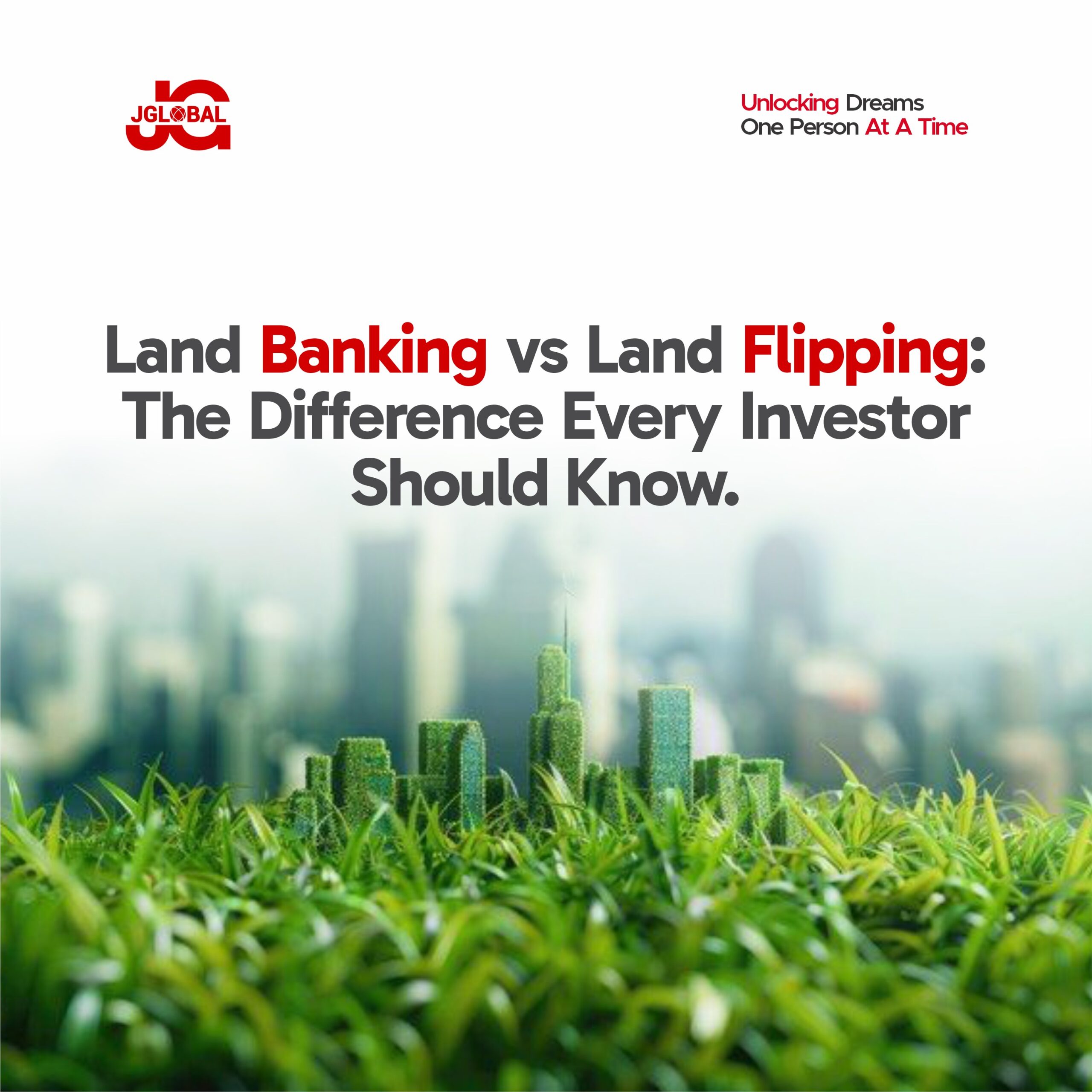Land Banking vs Land Flipping: The Difference Every Investor Should Know

Introduction
In real estate, one truth remains constant: the “bush” people laugh at today often becomes tomorrow’s prime location. But here’s the thing: there are different ways to make money from land, and two of the most common are land banking and land flipping. If you’ve ever wondered, “Land banking and land flipping, which one is better?” you’re not alone.
Understanding the differences between land banking and land flipping can significantly impact your investment strategy in real estate. Land banking and land flipping both have unique advantages that can lead to financial growth.
Both strategies can build wealth, but they are very different. And if you don’t understand the difference, you could lose money or miss out on opportunities.
Let’s break it down.
What is Land Banking?
Many investors find success with both land banking and land flipping, depending on their financial goals and timelines.
Land banking is the practice of purchasing undeveloped land at a relatively low cost and holding it for an extended period, with the expectation that the land will appreciate in value due to urbanization, infrastructure projects, or population growth.
It is like saving money in a fixed deposit account only this time, it’s land. You buy a piece of land in an area that is not yet developed and you hold it for 5-10 years or more. Years later, when development reaches there, the price shoots up and you earn.
For example, people who bought land in Epe ten years ago for ₦50K are now selling at over ₦10 million because of the Lagos State projects going on there. That’s the beauty of land banking: it’s slow, steady, and powerful.
Read more on the latest suburbs in Lagos to buy in now
Why do people go into land banking in real estate?
- Land is cheaper in undeveloped regions.
- You can pass it down as generational wealth.
- It’s less risky since the area is expanding.
To do land banking, you need patience. This is not for someone who wants quick returns.
What is Land Flipping?
Land flipping is the act of purchasing land in a strategic emerging location at a below-market value and reselling it within a short period for a profit, often without making significant improvements to the land.
Land flipping is like buying sneakers on sale today and selling them tomorrow when demand is high. Only this time, it’s land.
With land flipping, practitioners often compare it to land banking due to the different timelines involved in realizing profits.
Why do people jump into land flipping?
- Fast profits compared to land banking.
- Perfect if you want cash flow.
- You don’t have to wait 10 years to see results.
If the “development” you’re banking on delays or doesn’t happen, your land may not appreciate fast enough to flip at a good price.
Key Differences Between Land Banking and Land Flipping

Both strategies involve land, but the way you approach them is totally different: Differences between Land Banking and land flipping.
The 4 key wealth generators in Real Estate.
- Timeline
Land banking is a long-term game. You’re buying land today and holding it for years—sometimes 5, 10, or even 20—until the value appreciates. On the other hand, land flipping is short-term. You’re looking to buy now and resell quickly once prices rise, maybe in a year or two. - Risk
With land banking, the risk is generally lower because the area keeps expanding. It’s almost certain that what looks like “bush” today will gain value tomorrow. Land flipping, however, carries more risk. If the development you’re banking on doesn’t happen as fast as expected, you could get stuck with land that’s harder to resell at a profit. But when it works, the reward is massive. - Capital Needs
Land banking is often cheaper to start because you can buy land in less-developed areas where prices are still low. Flipping usually requires more upfront capital because you need to buy in locations that are already hot or about to appreciate, meaning higher entry prices. - Investor Type
Land banking is for the patient investor who’s thinking about wealth in 10 or 20 years—someone who doesn’t mind waiting. Land flipping is for the aggressive investor who loves quick wins and doesn’t mind taking bigger risks for faster cash.
So, when you’re weighing land banking vs land flipping in Nigeria, the real question to ask yourself is: Am I willing to wait patiently for wealth to grow, or do I want to chase faster profits even if it means higher risk?
Both land banking and land flipping require thorough research and understanding of market trends to succeed.
Which Strategy Should You Choose?
Honestly, it depends on your goals.
- If you want a safe, long-term real estate investment, go for land banking.
- If you want quick profits and don’t mind the risk, land flipping is your best bet.
- Some smart investors actually mix both banks with some land for the long-term and flip others for short-term gains.
Either way, both strategies fall under the best real estate investment in Nigeria because land will always appreciate.
Land is one thing that never loses value. If you’re planning to buy land in any region in Nigeria, for the future (banking) or flip it for quick returns, the key is knowing which strategy works for your lifestyle and finances.
And please, don’t just follow hype. Work with a professional who knows the market. One wrong move in your real estate investment can cost you millions.
Conclusion
When deciding between land banking and land flipping, consider how each strategy aligns with your investment timeline and risk tolerance.
At the end of the day, land banking vs land flipping is not about which is “better,” but about which fits your goals. Both can make you wealthy if you play the game right.
If you find yourself torn between land banking and land flipping, consider experimenting with both strategies to diversify your portfolio.
So, are you the patient type who wants to hold land for years, or the hustler who wants to cash out quickly?
Whichever side you fall on, the most important step is this: invest in a property now, before prices explode further.
Ultimately, your choice between land banking and land flipping will depend on your investing style and goals.
In conclusion, both land banking and land flipping offer viable paths to wealth creation in real estate.
Ultimately, the decision between land banking and land flipping comes down to personal preference and investment strategy.
Whether you choose land banking or land flipping, remember that both strategies can lead to financial success.
Now that you have an understanding of land banking and land flipping, it’s time to take action in the real estate market.
In summary, land banking and land flipping represent two distinct approaches to real estate investing that cater to different investor profiles.
As you navigate your choices, keep in mind the benefits of both land banking and land flipping to maximize your returns.



